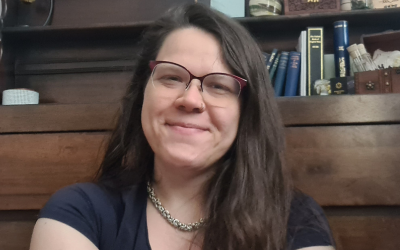Leigh Blaney
 The flexibility and support offered by The Open University (OU) in Scotland has made it possible for Leigh Blaney to gain her dream job as an engineer, while balancing working full-time, a new baby, and facing new challenges, including ongoing health issues caused by COVID-19.
The flexibility and support offered by The Open University (OU) in Scotland has made it possible for Leigh Blaney to gain her dream job as an engineer, while balancing working full-time, a new baby, and facing new challenges, including ongoing health issues caused by COVID-19.
Pregnant when she applied to study for a Master of Science (MSc) in Computing with the OU in Scotland, Leigh set out to prove wrong those who doubted she could manage working full-time, studying and having a baby at once.
Now aged 35, and based in North Ayrshire working as a Senior Software Engineer, she explains: “I wanted to gain an edge in my career, and achieving a Master’s degree had been a dream of mine for a long time.
“I explored options, and it quickly became obvious that if I wanted to keep working and gain a degree from a respected institution, the OU was the way to go.”
Flexible studies
I had some pretty difficult health and life circumstances. My tutor was great and the student support team also helped me.”
Discussing the flexibility offered by the OU, Leigh explains: “The timing and being fully remote meant I could fit studying around full-time work and childcare.
“It was important to be able to drop what I was doing if my daughter needed me and speak to my tutor by phone and email, rather than having to travel. I just couldn't have worked with set lesson times.”
Access to the Part-Time Fee Grant supported Leigh to undertake a Postgraduate Diploma, of which she says: “There’s no way I could’ve afforded to study without it.” She then negotiated funding from her employer to complete her final year.
Over the course of six years of studying, Leigh shares: “I had some pretty difficult health and life circumstances – ill-health, loved ones dying, moving house, divorce, new jobs, and promotions.
“I had a baby right at the start, which came with all the challenges of raising a child. And obviously we had a global pandemic, which left me with ongoing health issues.
“The Open University was fantastic in making sure I was able to take time off or adapt. I was in hospital a few times, including during my dissertation year. My tutor was great with adjusting deadlines and making sure I was supported in getting back on track.
“The student support team also helped me plan my units out so that I could take longer studying breaks when needed.”
‘Dream job’ and promotions
Studying and gaining my degree helped me to transition to my dream job as an engineer and achieve promotions.”
Leigh says she looks back over that period and wonders how she coped, but adds: “Well, I did manage it. That’s an incredible feeling.”
“Studying and gaining my degree helped me to transition to my dream job as an engineer and achieve promotions.
“It was more than just knowledge gained – doing a degree on my own time is proof that I can work hard and have the motivation to learn and grow,” she says.
Leigh now works with management systems that connect renewable energy providers with the national grid.
Discussing the importance of encouraging more females into science, technology, engineering, and mathematics (STEM) careers, she comments: “Software as a discipline thrives on a variety of intelligent input.
“The solutions we create are better when we have people working together from different backgrounds and ways of thinking. It’s also important that the people creating solutions have the life experiences of the people using them, otherwise how do we know we’re even solving the right problems?”
She adds: “STEM is great for mothers because of the relatively higher salaries and opportunities to work more flexibly around childcare. I can afford to pay for after-school care and work from home when my child is sick. A lot of careers just don’t enable that.”
Work with the OU to plan how your study can be most effective.”
OU advice and support
To anyone wanting to study but facing barriers, Leigh suggests: “If it’s what you want, then assess the challenges you face and work with the OU to plan how your study can be most effective.
“They are used to working with students with a variety of difficulties, and able to offer advice and support.”
She concludes: “Don’t let other people tell you it’s too much to handle because you’re a parent, or disabled, or a carer, or whatever other reason they might give.”